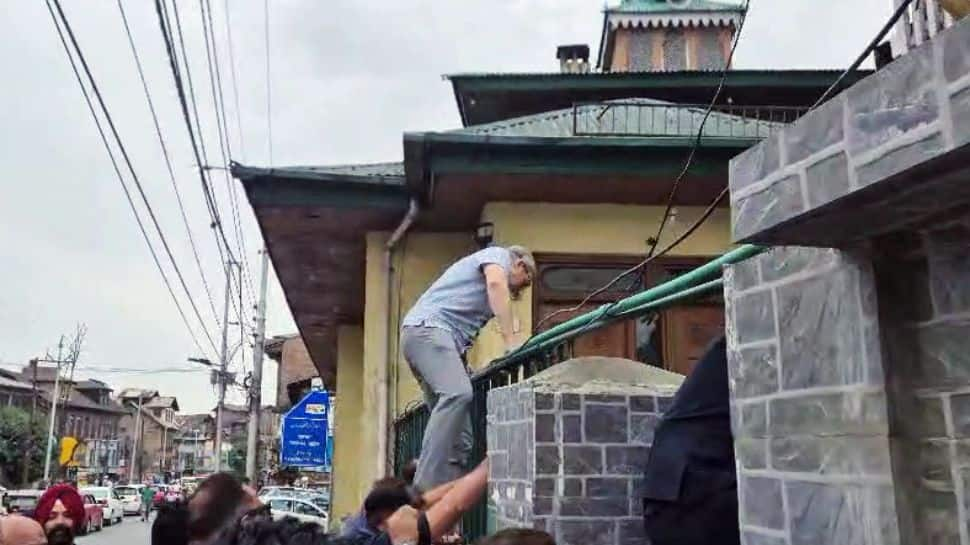Top Stories
Omar Abdullah Faces Backlash Over Martyrs’ Day Visit in Kashmir

Political tensions escalated in Jammu and Kashmir when Chief Minister Omar Abdullah attempted to pay tribute to martyrs on July 13, a significant date in the region’s history. His efforts were met with substantial criticism from opposition parties, who accused him of neglecting his responsibilities on a day meant to honor those who lost their lives during protests in 1931.
On Sunday, July 13, Abdullah was not present in the Valley, leading to immediate backlash. He returned around 19:00 local time, claiming that police had blocked his access to the martyrs’ graveyard at the Naqshband Sahib shrine. He alleged that a police bunker was positioned at his residence, preventing him from leaving until midnight.
In a dramatic turn, Abdullah, accompanied by his father, Farooq Abdullah, and other party leaders, bypassed multiple barricades on Monday to reach the graveyard. They scaled a wall to access the site, where they paid their respects to the martyrs. Abdullah voiced his frustration, stating, “It’s very unfortunate that the people who claim their duty is only to maintain law and order… were not allowed to offer Fatiha at the martyrs’ graveyard.” He emphasized that commemorating the martyrs should not be restricted to a single day, asserting their significance throughout the year.
The incident drew sharp criticism from various political figures. Iltija Mufti, spokesperson for the People’s Democratic Party (PDP) and the daughter of former Chief Minister Mehbooba Mufti, expressed her disapproval, pointing out that she managed to visit the graveyard a day earlier, fearing restrictions would prevent her from doing so on the actual day. She remarked in a video statement, “Before becoming Chief Minister, Omar Abdullah sahab committed to honoring Martyrs’ Day… But a year later… he chose to stay away in Delhi rather than stand up for his people.”
Sajad Gani Lone, Chairman of the Jammu and Kashmir People’s Conference, criticized both Abdullah and Mufti, suggesting that their visits appeared orchestrated. He called for Abdullah to resign, expressing that the treatment he received was an insult to the Chief Minister’s office. Lone stated, “Don’t set a precedent which others will have to follow—a precedent of humiliation.”
The situation was further complicated by the opposition from the Bharatiya Janata Party (BJP), which has historically contested the legitimacy of observing Martyrs’ Day. BJP spokesperson Altaf Thakur labeled the day a “Black Day” in history, arguing that the individuals commemorated were not martyrs but rioters responsible for violence against Kashmiri Pandits. Thakur stated, “It was a political drama to keep himself relevant,” adding that these events only served to highlight the National Conference’s failures since assuming power.
In contrast, Mamata Banerjee, Chief Minister of West Bengal, expressed solidarity with Abdullah. She condemned the actions taken against him, calling them “unfortunate and unconstitutional.” Banerjee expressed her shock on social media, stating, “What is wrong in visiting the graveyard of martyrs? This is not only unfortunate, but it also snatches the democratic right of a citizen.”
The administration’s restrictions on July 13 were officially justified due to concerns about law and order. A public advisory issued by the district administration on July 12 denied permission for visits to the graveyard, leading to heightened police presence and barricades throughout Srinagar. This day commemorates the sacrifice of 22 individuals who died protesting against the Dogra Maharaja Hari Singh’s rule in 1931.
Historically, Martyrs’ Day was a public holiday in Jammu and Kashmir, allowing citizens and political leaders alike to gather at the graveyard. However, after the abrogation of Article 370 in 2019, the holiday was removed, and official observances were banned. The National Conference had previously pledged to restore the significance of this day, and Abdullah’s government had requested the Lieutenant Governor to reinstate it as a public holiday.
The political landscape in Jammu and Kashmir remains fraught, with differing narratives around Martyrs’ Day reflecting broader tensions within the region. As the debate continues, Abdullah’s actions and the reactions they provoked underscore the complexities of leadership in a historically contentious environment.
-

 World7 months ago
World7 months agoSBI Announces QIP Floor Price at ₹811.05 Per Share
-

 Lifestyle7 months ago
Lifestyle7 months agoCept Unveils ₹3.1 Crore Urban Mobility Plan for Sustainable Growth
-

 Science6 months ago
Science6 months agoNew Blood Group Discovered in South Indian Woman at Rotary Centre
-

 World7 months ago
World7 months agoTorrential Rains Cause Flash Flooding in New York and New Jersey
-

 Top Stories7 months ago
Top Stories7 months agoKonkani Cultural Organisation to Host Pearl Jubilee in Abu Dhabi
-

 Science7 months ago
Science7 months agoNothing Headphone 1 Review: A Bold Contender in Audio Design
-

 Sports6 months ago
Sports6 months agoBroad Advocates for Bowling Change Ahead of Final Test Against India
-

 Top Stories7 months ago
Top Stories7 months agoAir India Crash Investigation Highlights Boeing Fuel Switch Concerns
-

 Business7 months ago
Business7 months agoIndian Stock Market Rebounds: Sensex and Nifty Rise After Four-Day Decline
-

 Sports6 months ago
Sports6 months agoCristian Totti Retires at 19: Pressure of Fame Takes Toll
-

 Politics7 months ago
Politics7 months agoAbandoned Doberman Finds New Home After Journey to Prague
-

 Top Stories7 months ago
Top Stories7 months agoPatna Bank Manager Abhishek Varun Found Dead in Well









